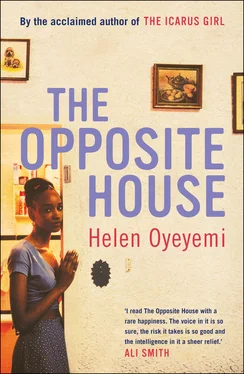Helen Oyeyemi - The Opposite House
Здесь есть возможность читать онлайн «Helen Oyeyemi - The Opposite House» весь текст электронной книги совершенно бесплатно (целиком полную версию без сокращений). В некоторых случаях можно слушать аудио, скачать через торрент в формате fb2 и присутствует краткое содержание. Год выпуска: 2008, Издательство: Bloomsbury UK, Жанр: Современная проза, на английском языке. Описание произведения, (предисловие) а так же отзывы посетителей доступны на портале библиотеки ЛибКат.
- Название:The Opposite House
- Автор:
- Издательство:Bloomsbury UK
- Жанр:
- Год:2008
- ISBN:нет данных
- Рейтинг книги:4 / 5. Голосов: 1
-
Избранное:Добавить в избранное
- Отзывы:
-
Ваша оценка:
- 80
- 1
- 2
- 3
- 4
- 5
The Opposite House: краткое содержание, описание и аннотация
Предлагаем к чтению аннотацию, описание, краткое содержание или предисловие (зависит от того, что написал сам автор книги «The Opposite House»). Если вы не нашли необходимую информацию о книге — напишите в комментариях, мы постараемся отыскать её.
The Opposite House — читать онлайн бесплатно полную книгу (весь текст) целиком
Ниже представлен текст книги, разбитый по страницам. Система сохранения места последней прочитанной страницы, позволяет с удобством читать онлайн бесплатно книгу «The Opposite House», без необходимости каждый раз заново искать на чём Вы остановились. Поставьте закладку, и сможете в любой момент перейти на страницу, на которой закончили чтение.
Интервал:
Закладка:
But early in the next day the fresh air in the room is spent, and the carpet around the chest of drawers is ringed in charcoal dust.
Amy is gone.
In her absence, Amy’s room, baring itself between hills of glass-bead necklaces, socks, books and shrugged-off cardigans, is filled with grey light. Tayo, one hand clad in Amy’s green silk handkerchief, stands at her dresser as if he is awaiting some news or appearance. He is so angry that he does not know what to do with himself, how to stay inside his skin. He shakes his head, bares his teeth to maul the air, but he doesn’t leave the room.
He says, simply, ‘Where is she?’
‘You love her?’ Aya is serene.
‘Amy,’ he says, ‘is missing. And you’re asking stupid questions.’
His smile is unguarded, also it is antique somehow
(yes, yes, who are you to me? Almost I know) his arms come down around her, draw her to him; she arcs under the pressure of his hand. His ache comes to her loudly. It comes through his chest.
‘We have to get Amy to come back.’ Tayo’s wish is spoken into her hair.
Aya closes her eyes against him. She will not go.
‘Please,’ he says.
In the attic of the somewherehouse, Proserpine is hanged. She is like a pale, black-sheathed pendulum caught on a ceiling beam, in a quiet space behind the door that will not trouble anyone. As long as they stay outside, as long as they avoid looking to the left and catching sight of a bare, dapper foot, toes achieving the perfect pirouette. The mirrors report the hanging first; they are stern and reproving, then they make eulogy in softened light. Dozens of refracted Proserpines, faces forced up by frantic throats.
Proserpine not Mama, Proserpine not Mama.
Why, then, has Mama’s face returned to this woman?
Her eyelashes, settled on her cheeks, spike the black clouds of her hair.
Tayo is downstairs — Aya hears muffled thumps, as if he is moving things around. The somewherehouse’s cedar beams whisper to her of their alarm, but she ignores them and turns away.
‘Tayo, don’t come up here,’ Aya calls, and shuts the door.
Her Papa, high, high in the roots and the snow, must know of this by now. Downstairs, the somewherehouse has thrown off its disguise. The house recognises her with a sniff — about time. Aya falls to her knees, winded. All of the running that she has ever done, all of that fleeing for freedom from the Regla house, just to find the Regla house unfolding before her again. This hallway lit with a galaxy of gas lamps.
Tayo stands in the centre of the hallway and looks up at the domed ceiling, the rich stains that form the Creation fresco. Young river, wild-eyed rooster, bulging palm kernel — poised intent on a beginning against the sky. They reach the big window at the end of the hallway and Aya leans out, touches the trees; their leaves rustle under her hands with well-fed laughter, sated by the sun and the warm earth. But Tayo is afraid. Aya tries to take his hand. She tries to bring him with her into the next room, but Tayo will not come. His smile is as hard and dark as mud clay. Aya frowns and calls Tayo’s name, gently calls on him to explain, but Tayo says, ‘No, not him.’
He backs away from her, holding his arms out to her; she follows him step for step, down, down into the dust, the basement. Step for step, she tries names, old names, newer names, until she remembers her Mama’s tale of the trickster who left the family for change.
She asks, ‘Elegua?’
‘No!’
‘Echun. .’
He is crying hard now, the shape of his face buckles as if under blows.
‘Oh, Echun,’ Aya says. ‘Echun, why? What’s wrong?’
‘Yeye,’ he says. ‘I know who I am. Shhh, I know. I know. But I have to be different. I have to be stronger. Needles and drowning; your Papa is trying to make me kill myself. But. . but I can’t let him take my ache , no, no, he cannot have it all, he must leave my ache with me.’
He opens the door for London — the Lagos door is nailed shut. And he has matches. The basement cloth is slippery underfoot, he has wet them with something moss-smelling, something unordinary. Aya goes to him, but he holds her away with terror, as if she is a chemical rag that will stain him. He keeps saying he wants her, but that she is her father’s eye. It is funny how afraid he is. Aya stops fighting him. She wants to spit at him, she wants to scratch him and hurt him, she wants him to die, she wants to go with him. She is drawn to him, sure and true, by her own instinct, the instinct of the runaway to be away, always away, always leaving, and running, running, running for home, hoping never to get there. Echun is beautiful, she sees that again. Of course it is because he is a trick.
‘Give me the matches,’ Aya says.
He does not trust her — he only gives them up to her slowly. He is ready to fight her. Without taking her eyes from his, Aya strikes and lights a match.
‘Go,’ she says, and drops it. Heat throws a swift and screaming shape between them. Aya strikes more matches. These flames are hungry, glad, lean. They move in colourless crests.
‘Shut the door,’ she says.
She does not see his face as he does; from behind the fire she cannot be certain whether he closes the door quickly or slowly. She thinks, Poor Echun . It doesn’t matter that he wants to keep his ache; her Papa will take it back. What matters is that Echun doesn’t want her enough to risk being found.
Greedy Echun. There is much that Aya would have risked for him.
Aya climbs higher to escape the noise of wood breaking beneath the flames. She dreams of what happens next, after the fire has taken her bones. She squints through veils of smoke, follows the trail to the top of the house, lies down under the sweeping glass ceiling. And Amy is there, Amy in her baggy dungarees, but she has changed. Aya pauses long and looks her fill at Amy in the Kayodes’ rocking chair: Amy’s Ochun-lips take a straight and sober line; her Ochun-skin, newly hazelnut, glows; her open eyes contain only the tenderest blessings of darkness; her hair is plaited into thick, shimmering vines. Aya doesn’t touch her — she leaves her be.
Fire climbs the stairs.
There is more time, but not much.
If you are lucky, you lose a mother to get another.
If you are lucky, you shed a body to climb inside another.
Sometimes a child with wise eyes is born. And some people will call that child an old soul. And that is surely enough to make God laugh.
This morning I wait for the plumber. I wait and wait and the plumber doesn’t come, and while I wait I try to mend the leak with my calm.
Indoor rain. It does not stop, I don’t know what it means — something has opened somewhere and the rain is just there. Raintalk.
I phone Aaron. He answers so quickly that I barely realise I’ve finished dialling and I think he’s called me. He says, ‘What’s wrong?’
I pace the sitting room, heel to toe. ‘Did you call?’
‘Did I . .?’
‘Aaron, did you call a plumber?’
He says, very slowly, ‘This is why you’re calling me?’
He is too loud. I wince and hunch my shoulders; my eyes are fixed to the phone pad, the imprints my writing has left on the paper beneath.
‘The plumber isn’t here yet. How come?’ I say.
‘Maja,’ he says. Disbelief brings him down to baritone. But I walk myself into the bedroom, asking him, asking him. He says, ‘Listen, I forgot to call. I forgot. I’ll do it tonight. I’m bringing back some stuff about Lamaze classes. I think you dismissed them too quickly when Dr Maxwell suggested them.’
I have found Aaron’s jeans, folded into his top drawer. He is talking about birth pain management, and in my palm I have my crumpled list of phone numbers from his pocket, the figures so small that they disappear into the crinkles. I have had to work at the paper with my fingernails to open it out. Aaron has folded and rolled my list of plumbers until it has taken on the hard, round unity of a shell.
Читать дальшеИнтервал:
Закладка:
Похожие книги на «The Opposite House»
Представляем Вашему вниманию похожие книги на «The Opposite House» списком для выбора. Мы отобрали схожую по названию и смыслу литературу в надежде предоставить читателям больше вариантов отыскать новые, интересные, ещё непрочитанные произведения.
Обсуждение, отзывы о книге «The Opposite House» и просто собственные мнения читателей. Оставьте ваши комментарии, напишите, что Вы думаете о произведении, его смысле или главных героях. Укажите что конкретно понравилось, а что нет, и почему Вы так считаете.












